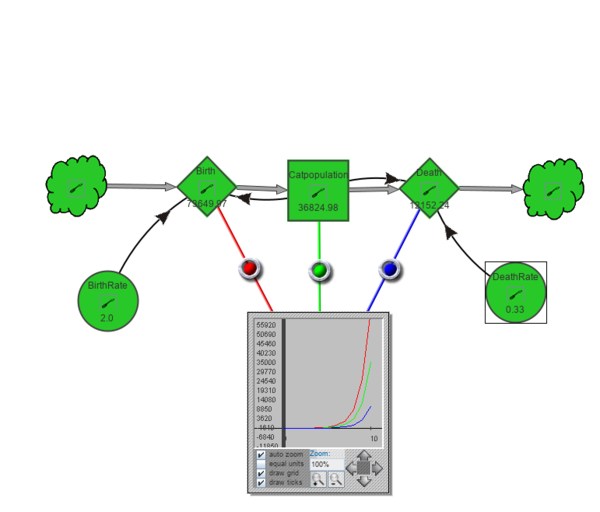System Dynamics (FreeStyler): Difference between revisions
mNo edit summary |
m (→Example) |
||
| Line 14: | Line 14: | ||
* Death rate is 0.33 / year, i.e. on average 1 out of three cats dies every year. | * Death rate is 0.33 / year, i.e. on average 1 out of three cats dies every year. | ||
[[image: system-dynamics-cat-simulation-1.png|none|thumb| | [[image: system-dynamics-cat-simulation-1.png|none|thumb|600px|System dynamics palette of FreeStyler]] | ||
After 10 years we got almost 36'000 cats. That is impressive. A real model would include food for cats (e.g. mice) and food for mice (e.g. grass) and interactions between these variables. | After 10 years we got almost 36'000 cats. That is impressive. A real model would include food for cats (e.g. mice) and food for mice (e.g. grass) and interactions between these variables. | ||
Revision as of 18:25, 7 March 2019
This article shortly documents the system dynamics plugin for the Freestyler software. As of Feb 2019 the program is still working under Windows §10 and Ubuntu 10. However, it requires some extra installation efforts described in the Freestyler article. Also, mouse behavior is fairly erratic which is probably due to the fact that Java programs age very badly, even if adapted for the latest Java Runtime. Anyhow, apart from these shortcomings, the program does its job and in addition runs within an environment that includes other interesting educational applications.
The system dynamics palette
Example
The following example (badly) models a system for cat growth:
- We start with a population of two
- Birth rate is 2 / year, i.e. on average a couple of cats produces 4 cats / year
- Death rate is 0.33 / year, i.e. on average 1 out of three cats dies every year.
After 10 years we got almost 36'000 cats. That is impressive. A real model would include food for cats (e.g. mice) and food for mice (e.g. grass) and interactions between these variables.

